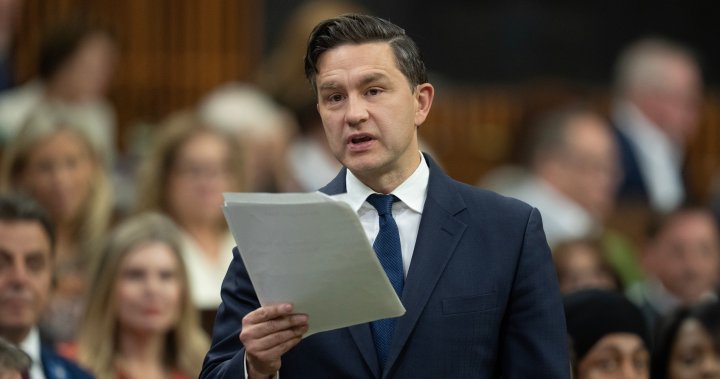The Conservatives have presented a second non-confidence motion in an attempt to bring down Prime Minister Justin Trudeau’s government after their first attempt failed. The motion, presented by Conservative MP Luc Berthold, accuses the Liberal government of causing increased housing costs, higher taxes on food, hindering work, and contributing to rising crime rates. If the motion were to pass, the government would fall, and a snap election would be triggered. The minority Liberals need the support of at least one other party in the House of Commons to survive such votes. MPs will debate the motion on Thursday and vote on it the following week. The pressure on the Liberals has been mounting after two significant byelection losses and the NDP withdrawing support from the supply-and-confidence agreement earlier in the month. Ipsos polling exclusive to Global News shows that support for Trudeau and his government has hit a new low, adding to the challenging political landscape.
The first non-confidence motion brought forward by Pierre Poilievre was defeated with a vote of 221-120, with the NDP and Bloc Quebecois joining the Liberals in defeating it. However, the Conservatives have not given up and are expected to continue tabling more such motions before Christmas. The new motion accuses the government of being the most centralizing in Canadian history and calls on Canadians to “axe the tax, build the homes, fix the budget, and stop the crime.” The pressure on the Liberals is further intensified by Bloc Leader Yves-François Blanchet’s ultimatum, giving the government until a specific date to pass two Bloc bills, or he will begin discussions with other parties about toppling the government. This increasing pressure on the Liberals showcases a challenging political environment that they now find themselves in.
The success of the non-confidence motion ultimately depends on the support of other parties in the House of Commons. The minority Liberal government needs the backing of at least one other party to avoid its downfall. The turbulent political landscape in Canada, with the Liberals facing challenges from both the Conservatives and the Bloc Quebecois, has put them in a vulnerable position. The pressure on the government has been mounting since a tumultuous summer that saw significant byelection losses and the NDP withdrawing support from their agreement. The Ipsos polling data revealing a decline in support for Trudeau and his government only adds to the difficult situation they are currently facing.
The timing of the non-confidence motion is crucial, as it comes at a time when the Liberal government is already facing heightened scrutiny and pressure. The Conservatives are taking advantage of this vulnerable position to try and bring down the government. With the support of the NDP and Bloc Quebecois in defeating the first motion, the Liberals are aware of the challenges they are up against. The upcoming debates and vote on the new motion will be critical in determining the fate of the government. If the motion were to pass, it would trigger a snap election, further adding to the political uncertainty in Canada. The outcome of this latest challenge to the government will have significant implications for the future direction of Canadian politics.
The upcoming debates and vote on the non-confidence motion are likely to be heated and closely watched by Canadians. The outcome will have far-reaching consequences for the government and the country as a whole. The tensions between the parties in the House of Commons are high, and the political landscape is fraught with uncertainty. The pressure on the Liberals to maintain their government and avoid a collapse is at an all-time high. With the support of at least one other party needed to survive such votes, the minority Liberals are navigating a challenging political situation. The coming weeks will be critical in determining the future of the government and the direction of Canadian politics.


